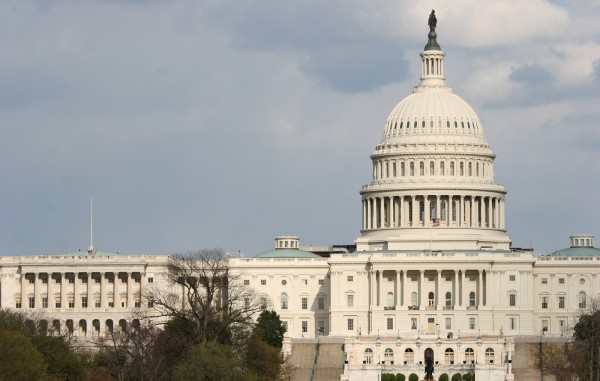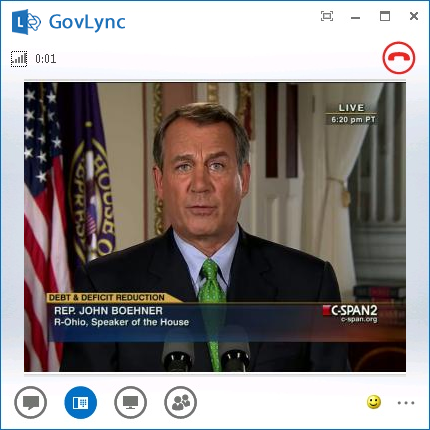Virtual U.S. Congress: a practical, plausible way to save millions in waste

The very notion of telecommuting has been present in the mainstream white-collar workplace now for well over a decade. Yet for one of the worst offenders in padding operating and travel expenses, namely the U.S. Congress, the notion of mentioning telecommuting seems to be downright sinful. One would think that these calls for a "virtual Congress" come from watchdog groups of various political winds. But shockingly enough, one of Congress' very own -- House member Steve Pearce of New Mexico (R) -- is leading the push to bring our legislative branch full circle into the 21st century.
The premise behind the technical, and very much cultural, shift in thinking for how Congress does its business is quite down to earth. "Corporations and government agencies use remote work technology; it’s time that Congress does the same," says Pearce on a landing page for his initiative. "Members of Congress can debate, vote, and carry out their constitutional duties without having to leave the accountability and personal contact of their congressional districts." A wholesale breath of fresh air, I say.
While eliminating wasteful spending is the primary reason my interest was perked by this legislation (House Resolution 137), there are numerous other perfectly sane considerations behind the bill. Just a few of those mentioned by Pearce include:
- The time loss associated with traveling from home states to D.C., and vice-versa.
- The significant distances that many in Congress need to travel to reach D.C.
- The fact that congressional staffers are isolated in D.C. instead of the localities of where constituents reside.
- The fact that secure internet lines, along with encrypted videoconferencing, exist in many forms today.
- The concerns behind all of Congress meeting together in one place consistently (i.e. security risks).
- The need for greater accountability by members of Congress.
And the list goes on. I laud Pearce for his efforts to markedly improve the way that our expense-tattered Congress does its business year in, year out. But as I mentioned, the bread and butter behind this legislation, as far as I'm concerned, sits within the fields of wasted dollars that Congress produces. While most congressmen prefer to keep a hush-hush silence on the money which oozes at the seams from their lavish culture, I have no issue telling it like it is.
The Numbers Behind "Business as Usual"
The digital age has blatantly uprooted the way most of us "average Joes" go about our daily lives. We're reading a majority of our news online as opposed to in print. Email has cut back on what was exclusively a vestige of the postal system. And most purposeful data is created -- and kept -- in the digital realm. Yet if you learned about any aspect of the workings of Congress, you'd be shocked at how '20th century' our nation's capital operates.
Take, for example, the ludicrous policy which forces the Government Printing Office to physically print hard copies of all bills on the floor for consideration in Congress. It was estimated that between 325-475 copies of any single bill are printed for congressmen at a time. The final copy of Obamacare, for example, comes in at 974 printed pages. If you want to kill some trees en-masse, try printing off the nearly 20,000 pages of Obamacare regulations that Sen. McConnell sarcastically posted a photo of online a few months back. A bill to stop this madness passed the House back in 2011 that could have spared taxpayers roughly $35 million over 10 years -- but not surprisingly, it failed to make progress in the Senate.

The 20,000 pages of Obamacare regulations sitting stacked in Sen. McConnell's office, printed by our very own Government Printing Office. A prime example of the waste our government basks in. A virtual Congress could essentially slim the GPO printing budget down to pennies. (Photo Credit: Senator Mitch McConnell)
The waste at the hands of Congress stemming from its digital phobia doesn't start or stop with its printing obsession. Even as Americans feel the pinch from sequester related cuts, Congress and its pampered staffers took no less than $1.45 million worth of trips in 2012. While this figure represents local and foreign travel alike, this number is surely bloated by the senseless back and forth that congressmen make between their hometown districts and Washington each month.
And the madness doesn't stop there. The red tape that dictates everything from how bureaucrats can travel, what kind of reporting they are required to make, and other rigid regulations fluff administrative overhead for these travel costs an easy 30 percent (based on Defense Department rules.) To add pain to injury, it doesn't help that congressmen are regularly booking multiple seats on subsequent flights to ensure they get to where they want to go, at any expense. And don't forget the super expensive front-row parking spots they are reserving at airports to cut down on commutes. The perks of being in Congress, I guess.
As if traveling in style and comfort wasn't plentiful enough, the vast offices that members of Congress and their expansive staffers have access to while in Washington are equally wasteful. The Congressional Research Service publishes a regular report aptly titled Congressional Salaries and Allowances which provides some nice insight into these plush congressional "homes away from home." Every member of the House is provided what is called a Members’ Representational Allowance (MRA) that is a slush fund of sorts to cover everything necessary in serving out their public duties. The Senate has their own version, the Senators’ Official Personnel and Office Expense Account (SOPOEA).
The CRS says that the average MRA for 2012 was $1,353,205, but could be as high as $1,564,613. That's per year, per congressman. Senators are even worse offenders, having an average SOPOEA budget in 2012 of $3,209,103.
This means that House representatives can churn through an average total of $588,644,175 per year, with Senators claiming an average total allowance of $320,910,300 per year. In total, this comes out to $909,554,475 of taxpayer money set aside merely to keep official Congressional life moving. How much of these budget allowances are truly necessary is up for discussion. But one cannot for a second say that this entire sum is a necessity of being a congressman.
Per the official CRS report, this money is used for items such as "staff, travel, mail, office equipment, district office rental, stationery, and other office supplies." I'm no budgetary expert, but I would make an educated guess that a virtual Congress could cut this yearly waste by a good 75% if not more. We don't need to look far to see where the sequester should have been targeted.
How Congressional Telecommuting could would Work
It's not a question of if a cultural transformation of the way Congress handles its business would be possible. It's purely a matter of how much benefit it could have not only on budgets, but on increased face-time between congressmen and their constituencies. Members of Congress could easily do a majority of their grunt work including voting, debates, staff meetings, and much more over the same technology used by 70 percent of the Fortune 500: Microsoft Lync.
There is nothing pie in the sky about Congress shifting it's work away from Washington and back to the towns and cities where they got elected in the first place. The amount of trips to and from D.C. would be cut by more than half. The useless pallets worth of printed drafts of bills could be eliminated and replaced by a solution like SharePoint. And all of the supporting phalanges that keep this monstrous machine moving could be drastically reduced, if not eliminated in most areas, because congressmen would be ideally working from the comfort of their homes or small local offices.

70 percent of Fortune 500 companies use Lync for their videoconferencing and telecommuting needs. Could this be the the way Congress does its business day-to-day in the near term? If it works for corporate America, there's no reason government can't follow suit.
In practical terms, there are not many reasons anymore why such a move to a virtual Congress would be such a difficult change. Beyond training everyone involved, and ensuring that a reasonable support staff was in place across the country to keep this digital change humming, the largest pieces of the puzzle are already widely available. And not surprisingly, various branches of government are already leveraging these technologies. The Federal Aviation Administration has already turned to Office 365 for Government, along with the likes of the Environmental Protection Agency as well as the US Department of Veteran's Affairs. Similar high-profile converts in the public sector have likewise turned to Google Apps for Government.
Just how little could the technology behind a virtual Congress cost? While Steve Pearce didn't include any estimates in his proposed bill, I'm going to go out on a limb and provide some food for thought. Using numbers provided by CSPAN back in 2000, this pits each House member at having an average of 14 staffers, and each Senator at roughly 34. Based on this, the number of direct members of Congress and their staff which would need a virtual platform for telecommuting and related work is 10,025. If each of these were given, just for discussion's sake, an Office 365 for Government E1 subscription at $6/month, the cost to equip Congress and its entire support staff would run a lowly $721,800 per year.
This cost would not only cover Lync Online to provide end-to-end videoconferencing, but a fully secure cloud-hosted Exchange Online email account, and access to SharePoint Online and Office Web Apps. Call me crazy, but that's enough for most people to be fully functional in an online workspace environment. For those who would counter a virtual Congress by pointing at security, Office 365 provides out of the box Lync Online encryption and optional fully encrypted Exchange Online email service. And for high stakes file sharing, encrypted VPN capability has been maturing for over a decade now. The technology to get this done already exists and is clearly already being used by facets of our government as mentioned earlier.
For those keeping tabs, such a cost is less than 1 percent of what we are currently allowing Congress to splurge on offices, mailings, travel costs, and the rest of the niceties that go hand in hand with running an office in Washington. Of course my estimates don't take into account the support costs that would go into keeping this digital infrastructure humming, but I'm sure even such a total would be chump change compared to the massive waste being dumped into travel and such to maintain a traditional "in-person" presence. The status quo in Washington has a tendency to balloon costs due to red tape, administrative overhead, and other porkbelly fluff so the savings I am estimating could be exponentially greater than what they seem.
So what's likely keeping Congress from putting their official votes down on Rep Pearce's common sense bill? The culture of corruption; the era of entitlement; call it what you wish -- the logic behind the lack of real change is the same. Former President Reagan understood this dilemma best. "Government does not solve problems; it subsidizes them."
Photo Credit: Joe Wilcox
 Derrick Wlodarz is an IT Specialist that owns Park Ridge, IL (USA) based technology consulting & service company FireLogic, with over 8+ years of IT experience in the private and public sectors. He holds numerous technical credentials from Microsoft, Google, and CompTIA and specializes in consulting customers on growing hot technologies such as Office 365, Google Apps, cloud hosted VoIP, among others. Derrick is an active member of CompTIA's Subject Matter Expert Technical Advisory Council that shapes the future of CompTIA exams across the world. You can reach him at derrick at wlodarz dot net.
Derrick Wlodarz is an IT Specialist that owns Park Ridge, IL (USA) based technology consulting & service company FireLogic, with over 8+ years of IT experience in the private and public sectors. He holds numerous technical credentials from Microsoft, Google, and CompTIA and specializes in consulting customers on growing hot technologies such as Office 365, Google Apps, cloud hosted VoIP, among others. Derrick is an active member of CompTIA's Subject Matter Expert Technical Advisory Council that shapes the future of CompTIA exams across the world. You can reach him at derrick at wlodarz dot net.
